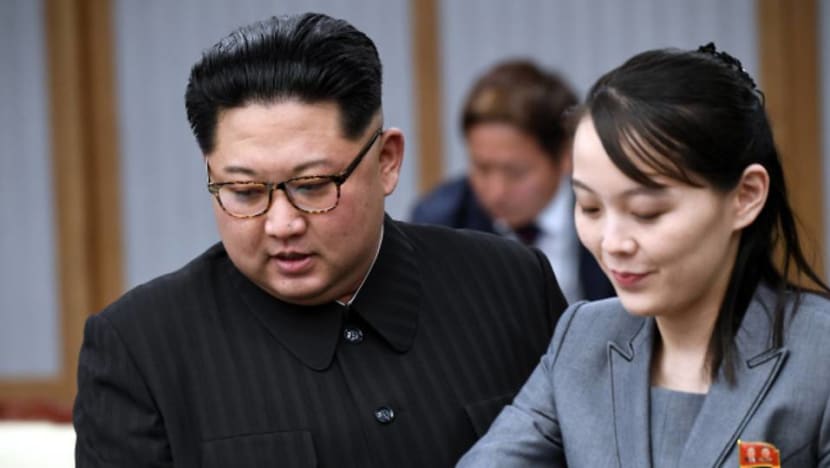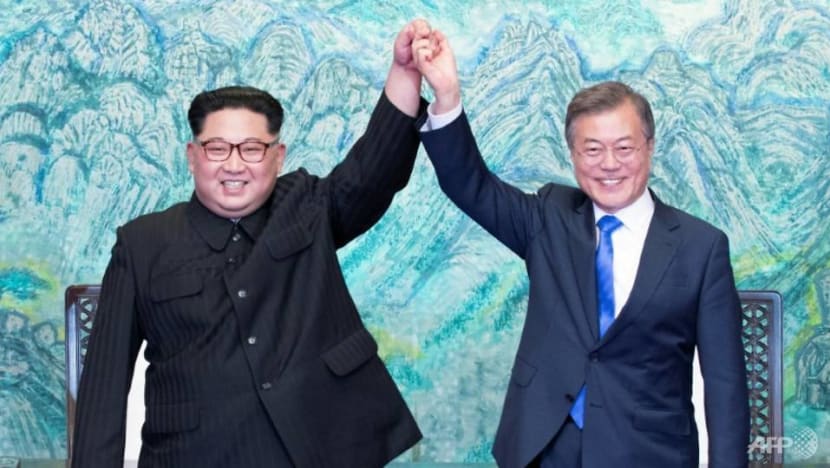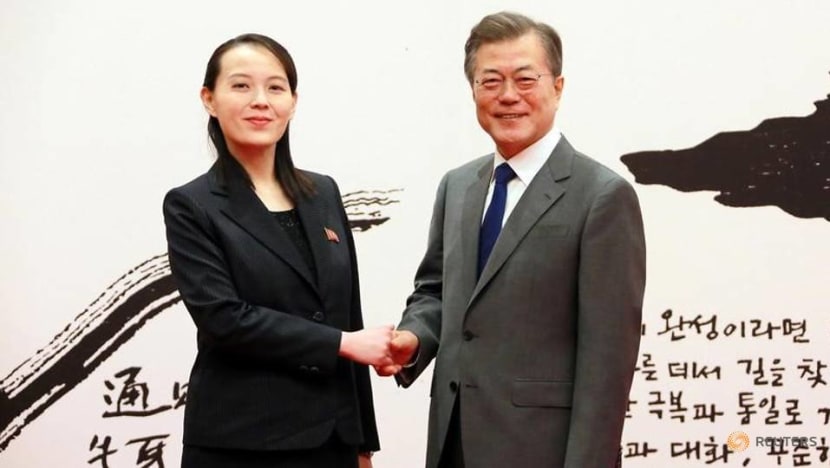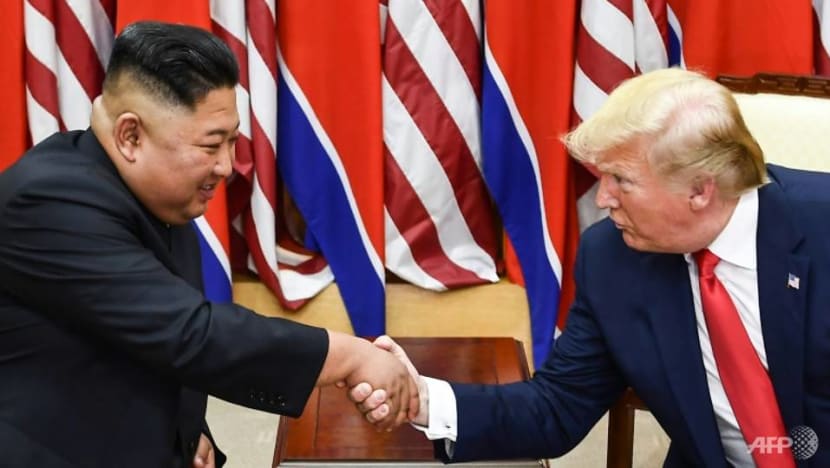commentary Commentary
Commentary: Imagine a North Korea without Kim Jong Un. Here’s why you can’t
Kim Yo Jong has risen as a potential successor amid rumours of North Korean leader Kim Jong Un’s health problems. Even so, little suggests much else will change, says Steven Borowiec.

North Korea's Kim Jong Un and his sister, Kim Yo Jong. (Photo: Cheong Wa Dae)
SEOUL: On Tuesday (Apr 21), for the first time in what feels like an eternity, a potentially scary story with no connection to the novel coronavirus pandemic subsumed the news cycle.
CNN reported, citing an unnamed US official with “direct knowledge,” that North Korean leader was in “grave danger” after undergoing surgery.
The report came after Kim was not present at events on Apr 15 to mark the birthday of his late grandfather, which is typically an important annual event not only for the country but also for him
GROWING CONCERNS ABOUT KIM
Speculation about Kim’s health isn’t surprising. The leader has never been known to be particularly healthy.
He is overweight, often appears in photographs smoking cigarettes and is reputed to have developed a liking for liquor and high-calorie food.
Even though Kim is only in his mid-30s, he has also been photographed walking with a cane for support.
North Korea is also famously secretive. The country doesn’t have a free press to report on the leadership’s activities, outside of stipulated officialdom. Outsiders who visit stick to official itineraries, seeing only what their minders show them.
READ: Commentary: The perfect storm for a COVID-19 outbreak lies in North Korea
READ: Commentary: Explosion in COVID-19 cases - was South Korea just unlucky?
Rumours of crisis or violence or upheaval in the North unsurprisingly tend to snowball from thinly-sourced, unverified media reports into international debates about what might come next.
The mere suggestion that Kim was unwell, without a groomed successor in place, was enough to affect markets, with the South Korean currency and stock market sent tumbling the following day.
The uncertainty might have fuelled the South Korea government’s downplaying such reports, and to US President Donald Trump’s dismissing these as “inaccurate”.

DISCONCERTING SCENARIOS
Still, the conversation over what North Korea, a nuclear-armed state, might look like without Kim at the helm has been stewing.
The nightmare scenario arising from speculation is downright frightening: A rudderless North Korea, where the state loses control, could mean unsecured nuclear and chemical weapons, and a flood of refugees into neighbouring China.
But even if Kim were to die, a popular rebellion or overthrow of the system would be extremely unlikely. There is no indication of any movement of any kind in North Korea plotting the regime’s demise and ready to step in at a time of vulnerability.
While North Korea is a black box, its system runs deeper than the rule of any one person. Critics have reportedly been jailed or worse.
KIM YO JONG EMERGES
North Korea has only known three leaders in its history. Kim’s grandfather founded the country. Kim inherited leadership from his late father, Kim Jong Il, in 2011.
Most speculation settled on Kim’s younger sister Kim Yo Jong as the most logical replacement. She has the inherent legitimacy of being a member of the founding family and has in recent years appeared to have taken a larger role in state affairs.
READ: China says it is aware of reports about North Korea leader's health
READ: Kim exit wouldn't change US goals in North Korea: Pompeo
Kim Yo Jong accompanied her brother to summits in Singapore and Hanoi. Earlier this month, she was also reappointed to the country’s politburo, responsible for setting the policy course of the ruling Workers’ Party.
She has also demonstrated the authority to make official statements in her own name in state media, continuing the family tradition of insulting critics of North Korea’s military actions.
After South Korea condemned a North Korean military drill in March, Kim Yo Jong likened South Korea’s presidential office to “a burnt child dreading fire,” while also calling the South a “frightened dog barking”.

That Kim has risen to his kind of substantive role in a few years demonstrates that her brother and his inner circle trust her.
The goal of these statements is likely for Kim to demonstrate her authority and her toughness. North Korea is a traditional, patriarchal kind of place, where age-based hierarchies govern most interactions. Kim Yo Jong being young and female would make it harder for her to win the deference of North Korea’s elite.
Yet in North Korea’s upper ranks, what matters most is family ties, and Kim Yo Jong would likely derive a huge part of her legitimacy, if not all of it, from those blood ties.
While South Korea’s intelligence agency has reported that Kim Jong Un has three children, North Korea has never confirmed those reports. Even if they are true, none of Kim’s offspring would be nearly old enough to run the country.
THE POWER TRANSITION
So what would North Korea look like without Kim Jong Un at the helm?
Unfortunately for the 25 million citizens of the country, it would probably look much like it does now - a hermit kingdom where most people outside of a wealthy elite live in poverty and lack civil rights.
READ: Commentary: As Iran-US drama plays out, North Korea leader Kim Jong Un takes notes
READ: Commentary: South Korea has been exemplary. Even then, it hasn’t slayed COVID-19
While North Korea doesn’t release data related to the economy, one study estimated poverty in the country at 60 per cent. The United Nations last year said that four out of 10 North Koreans were “chronically” short of food.
Power transitions in North Korea are generally followed by periods of uncertainty and aggression. If Kim were to die and his sister, or a more experienced high-ranking official, were to take over, that would likely lead to another round of tensions with the US.
The new North Korean leadership would be eager to test the US and see how much Washington would tolerate without repercussions.
Governments around the world, South Korea in particular, would put out warm statements about their eagerness to work with the new North Korean leader, holding out hope that changes at the top would create momentum for North Korea to finally come out of the cold, make concessions toward giving up its nuclear weapons and join the international community.

However, if there is one characteristic that has been consistent throughout North Korea’s history, it is an instinct for self-preservation, of keeping things mostly the same, protecting the elite’s comfort and privilege.
If Kim Yo Jong or any other member of North Korea’s upper echelon were to take power, their first priority would be protecting the interests of the elite, such as senior Workers’ Party members and well-off merchants called “donju,” and thereby ensuring their own safety at the helm of the country.
It is tempting to personalise the politics of states like North Korea, to assume that individual leaders guide the country, that with different leadership would come broad-based change. This is rarely the case, particularly in a system as sclerotic as North Korea’s.
News that Kim Jong Un could be in danger creates opportunities to imagine a different North Korea, perhaps a place where no one starves and the government cares more about ensuring the population’s well-being.
Sadly, even if Kim were gone, there is no reason to expect that.
Steven Borowiec is the politics editor of Korea Expose.














